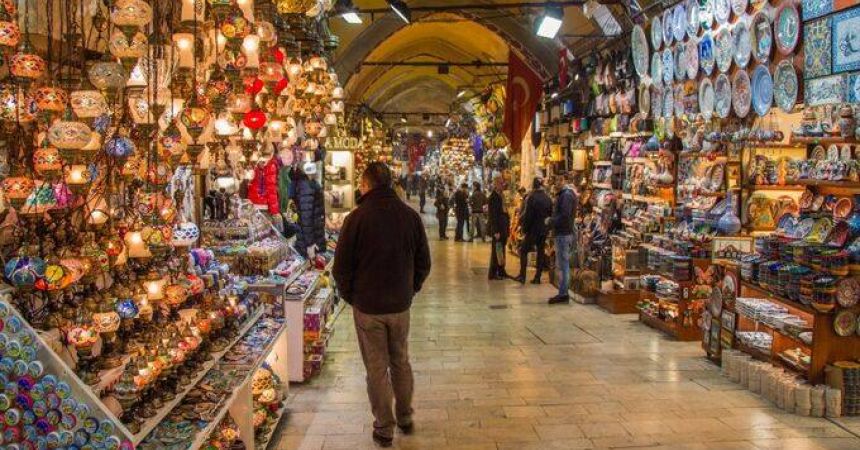
Exploring Turkey’s Traditional Bazaars
Turkey, a country where East meets West, offers travelers a treasure trove of rich cultural heritage, particularly when it comes to its traditional bazaars. These bustling markets are more than just places to shop—they are living, breathing centers of culture, history, and tradition. Whether you’re wandering through the colorful streets of Istanbul or exploring the quieter markets in smaller towns, Turkey’s bazaars provide an unforgettable sensory experience filled with exotic aromas, vibrant colors, and a dynamic mix of sights and sounds.
The Grand Bazaar: Istanbul’s Iconic Marketplace
When it comes to traditional bazaars in Turkey, few can match the fame and grandeur of Istanbul’s Grand Bazaar. One of the largest and oldest covered markets in the world, the Grand Bazaar is a must-visit for anyone traveling to Istanbul. It is not just a market, but a labyrinth of narrow, winding streets, each offering a different array of goods, from jewelry and textiles to spices and antiques. With over 4,000 shops and over 250,000 visitors a day, the Grand Bazaar is an overwhelming yet exhilarating place to explore.
History of the Grand Bazaar in Turkey
The Grand Bazaar has been an integral part of Istanbul’s commercial and cultural life since its establishment in the 15th century, shortly after the Ottomans conquered Constantinople. It was originally constructed as a small market but grew over time, eventually becoming the massive covered complex we know today. The Bazaar reflects the Ottoman Empire's diverse culture, as it brought together traders from across the empire and beyond, including Persia, Egypt, and the Arabian Peninsula.
The Bazaar’s design reflects the architectural style of the era, with grand domes, high ceilings, and intricate tile work. Over the centuries, the market has withstood fires, earthquakes, and floods, making it not only a commercial center but a symbol of Istanbul’s resilience.
What to Expect at the Grand Bazaar in Istanbul
Walking through the Grand Bazaar is like stepping into another world. The market is divided into different sections, each dedicated to a specific type of product. Some of the most popular sections include:
- The Jewelers’ Market: Glittering displays of gold, silver, and precious stones. Whether you’re looking for a high-end piece of jewelry or a small souvenir, this area is filled with options.
- The Carpet and Kilim Shops: One of the most famous purchases from the Grand Bazaar is a Turkish rug or carpet. The intricate designs and rich colors are the result of centuries-old craftsmanship. Many shops offer visitors the chance to watch the weaving process, and haggling is encouraged.
- The Spices Market: Known as Misir Çarşısı, the Spice Bazaar is located near the Grand Bazaar and is one of the most aromatic places in Istanbul. The air is filled with the scent of exotic spices, dried fruits, nuts, and herbal teas. Here, you can find a variety of goods, from traditional Turkish spices to saffron, rose petals, and even Turkish delight (lokum).
- The Textile Shops: These stores sell a wide range of beautiful, high-quality Turkish textiles such as scarves, shawls, linen, and cotton products. Be sure to check out the intricate embroidered fabrics and colorful patterned shawls.
Shopping Tips at Grand Bazaar in Istanbul
- Bargain: One of the best aspects of shopping at the Grand Bazaar is the opportunity to haggle. Prices are often marked higher than what the seller expects to receive, so it’s customary to negotiate. Don’t hesitate to offer a lower price, but do so politely.
- Visit in the Morning: The Bazaar can become very crowded in the afternoon, especially during the summer months. Arriving early gives you a better chance to explore without the large crowds.
- Cash is King: While many shops now accept credit cards, cash is still preferred, especially in smaller shops. Be sure to bring Turkish lira, although many shops will accept euros or U.S. dollars as well.
The Spice Bazaar in Istanbul: A Sensory Adventure
Just a short walk from the Grand Bazaar is the Spice Bazaar, or Misir Çarşısı, another of Istanbul’s most famous markets. The Spice Bazaar is one of the oldest covered bazaars in the city, and it’s filled with vibrant stalls offering everything from colorful spices to dried fruits, nuts, teas, and Turkish delights.
History of the Spice Bazaar
The Spice Bazaar was built in 1664 as part of the Yeni Mosque complex. The market was originally designed to support the mosque, as it was intended to provide revenue for its upkeep. Over the centuries, the Spice Bazaar has grown into a major trading hub for spices, herbs, and exotic goods, with merchants from all over the world bringing their wares to sell.
What to Expect at the Spice Bazaar
The Spice Bazaar is smaller and more compact than the Grand Bazaar, but it’s just as rich in history and culture. As soon as you step inside, you’ll be greeted by the intoxicating aromas of spices, fresh herbs, and sweet treats.
- Spices and Herbs: The aisles are filled with brightly colored piles of cumin, paprika, cinnamon, sumac, saffron, and more. For cooking enthusiasts, the Spice Bazaar is a paradise where you can stock up on high-quality, fresh spices to bring home.
- Turkish Delight (Lokum): One of the most famous products of the Spice Bazaar is Turkish delight, a sugary, chewy treat that comes in a variety of flavors like rose, pomegranate, and lemon. Vendors offer samples, so you can try before you buy.
- Herbal Teas: Along with spices, the market is filled with stalls selling fragrant herbal teas, such as apple tea, mint tea, and the famous Turkish çay (black tea). These are often sold in decorative tins, making them a perfect gift.
- Sweets and Nuts: The Bazaar is also filled with delicious dried fruits, nuts, and sweets like baklava, and various pastries that make for wonderful souvenirs to take home or enjoy on the spot.
Shopping Tips at Spice Bazaar in Istanbul
- Sample Before You Buy: Many spice vendors will allow you to sample their goods. Don’t hesitate to try a small piece of Turkish delight or a pinch of a spice before purchasing.
- Be Cautious of Overbuying: The Spice Bazaar is filled with enticing sights and smells, so it’s easy to get carried away. Make sure to stick to your budget, and consider buying small quantities of spices if you plan to bring them home.

The Arasta Bazaar Istanbul: A Hidden Gem in Sultanahmet
Tucked behind the Blue Mosque in the Sultanahmet district, Arasta Bazaar is a charming, lesser-known market that offers a more relaxed shopping experience compared to the Grand Bazaar and the Spice Bazaar. It’s smaller, quieter, and perfect for those looking to escape the crowds.
What to Expect at Arasta Bazaar
Arasta Bazaar is a great place to buy traditional Turkish souvenirs such as handwoven carpets, scarves, and handmade ceramics. There are also several shops offering antiques, jewelry, and textiles. The market is surrounded by cafes and restaurants where you can take a break and enjoy traditional Turkish tea or coffee.
Shopping Tips at Arasta Bazaar in Istanbul
- A More Relaxed Experience: Arasta Bazaar offers a quieter, more intimate shopping experience than the Grand Bazaar, making it ideal for families or those who want to shop without the hustle and bustle of larger markets.
- Check out the Ceramics: The handmade ceramics at Arasta Bazaar are beautifully crafted and make unique gifts or souvenirs. They come in various colors and patterns, often reflecting the artistic influences of the region.
Other Notable Bazaars in Turkey
While Istanbul’s bazaars are some of the most famous, Turkey is home to many other bustling markets that are worth exploring. Here are a few additional bazaars in Turkey that are not to be missed:
The Kemeralti Bazaar – Izmir
Located in the heart of Izmir, the Kemeralti Bazaar is a bustling marketplace filled with a mix of traditional and modern shops. You can find everything from clothing and jewelry to local food and antiques. It’s a perfect place to explore while visiting the Aegean coast.
The Antakya Bazaar – Hatay
The Antakya Bazaar in Hatay offers a more authentic and local shopping experience. Here, you’ll find a wide array of local goods such as baklava, olive oil, spices, and copperware. The bazaar is known for its warm atmosphere and friendly vendors.
The Bodrum Bazaar – Bodrum
Bodrum’s bazaar is perfect for those visiting the famous resort town. This market is filled with local textiles, handmade jewelry, pottery, and fresh produce. It’s also known for its vibrant atmosphere and the chance to buy local produce and crafts.
Final Tips for Shopping at Turkey’s Bazaars
Bargaining is Key:
Haggling is a traditional part of shopping in Turkish bazaars. Vendors often expect some negotiation, so feel free to haggle for a better price. Start by offering a lower price and work your way up from there.
Cash is King:
While many stores accept credit cards, smaller shops may prefer cash. Bring enough Turkish lira to cover your purchases, especially in more remote bazaars.
Respect Local Customs:
While shopping, be respectful of local customs. Take your time to appreciate the craftsmanship and stories behind the products, and engage with the vendors if you’re interested in learning more about their goods.
Wear Comfortable Shoes:
Bazaars can be quite large and sometimes crowded, so wear comfortable shoes for walking. You’ll also likely be doing some shopping, so it’s best to be prepared.
Exploring Turkey's Vibrant Bazaars and Markets
Turkey’s traditional bazaars are much more than just places to shop—they are windows into the country’s rich cultural history, a celebration of Turkish craftsmanship, and an opportunity to engage with local life. From the grandeur of the Grand Bazaar in Istanbul to the more intimate Arasta Bazaar, each market has its own unique character and offerings. Visiting bazaars is an essential part of any trip to Turkey, providing not only the chance to buy unique souvenirs but also to experience the country’s vibrant, centuries-old trading culture.
Whether you’re hunting for a beautiful Turkish rug, savoring the aromas of freshly ground spices, or simply enjoying the lively hustle and bustle of the market, Turkey’s bazaars offer an unforgettable experience that will stay with you long after you leave. So, the next time you visit Turkey, make sure to carve out some time to explore its traditional bazaars—you’ll discover treasures and memories that will last a lifetime.



